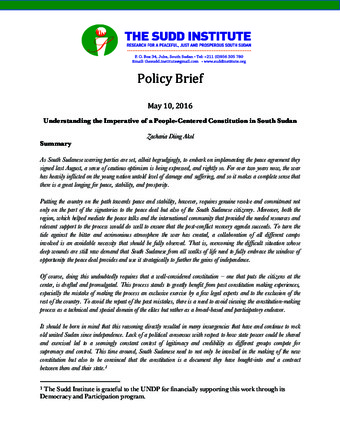Publications
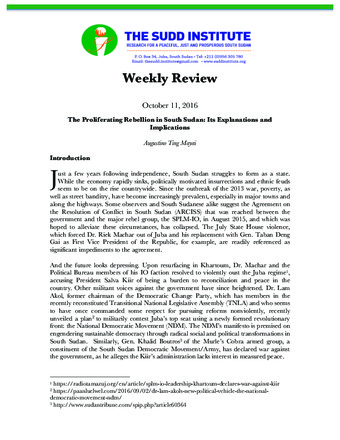
The Proliferating Rebellion in South Sudan: Its Explanations and Implications
Author: Augustino Ting Mayai
Type: Weekly Reviews
Date: 11/10/2016
For nearly a decade now, several armed groups have emerged all over the country, with some of them sometimes signing agreements with the government that last only a very short time. What normally follows, as historically evident, is a cycle of rebellions and sojourning political settlements, with rebel leaders shuttling...
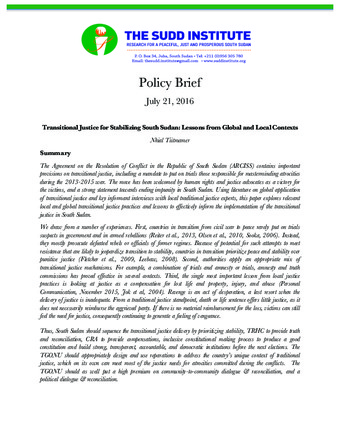
Transitional Justice for Stabilizing South Sudan: Lessons from Global and Local Contexts
Author: Nhial Tiitmamer
Organization: The Sudd Institute
Type: Policy Briefs
Date: 21/07/2016
The Agreement on the Resolution of Conflict in the Republic of South Sudan (ARCISS) contains important provisions on transitional justice, including a mandate to put on trials those responsible for masterminding atrocities during the 2013-2015 war.
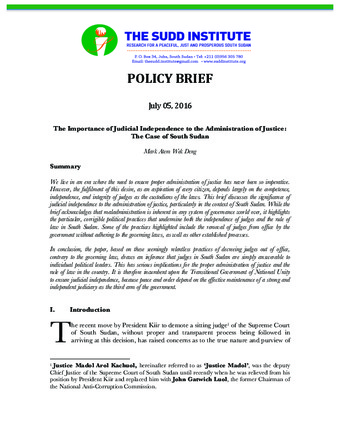
The Importance of Judicial Independence to the Administration of Justice: The Case of South Sudan
Author: Mark A. Wek Deng
Organization: The Sudd Institute
Type: Policy Briefs
Date: 05/07/2016
We live in an era where the need to ensure proper administration of justice has never been so imperative. However, the fulfilment of this desire, as an aspiration of every citizen, depends largely on the competence, independence, and integrity of judges as the custodians of the laws.
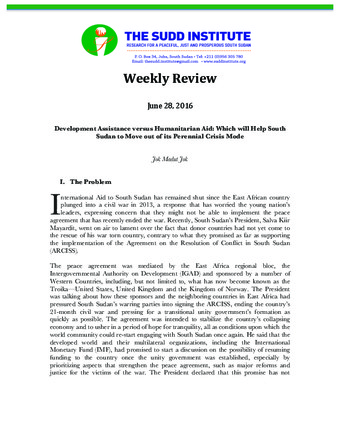
Development Assistance versus Humanitarian Aid: Which will Help South Sudan to Move out of its Perennial Crisis Mode
Author: Jok Madut Jok
Organization: The Sudd Institute
Type: Weekly Reviews
Date: 28/06/2016
Seven weeks since the Transitional government of National Unity was formed, however, international development assistance to South Sudan remains shut. The countries that sponsored South Sudan’s peace process have suggested that they have not really cut aid to South Sudan, but have simply channeled it toward humanitarian programs and away...
As South Sudanese warring parties are set, albeit begrudgingly, to embark on implementing the peace agreement they signed last August, a sense of cautious optimism is being expressed, and rightly so. For over two years now, the war has heavily inflicted on the young nation untold level of damage and...
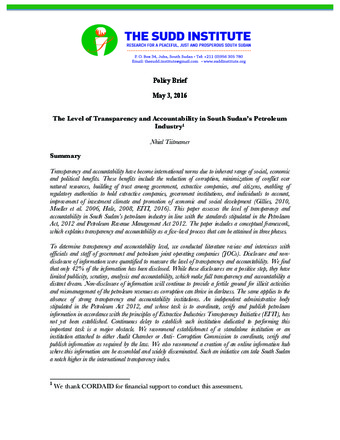
Transparency and Accountability in South Sudan’s Petroleum Industry
Author: Nhial Tiitmamer
Organization: The Sudd Institute
Type: Policy Briefs
Date: 03/05/2016
Transparency and accountability have become international norms due to inherent range of social, economic and political benefits. These benefits include the reduction of corruption, minimization of conflict over natural resources, building of trust among government, extractive companies, and citizens, enabling of regulatory authorities to hold extractive companies, government institutions, and...
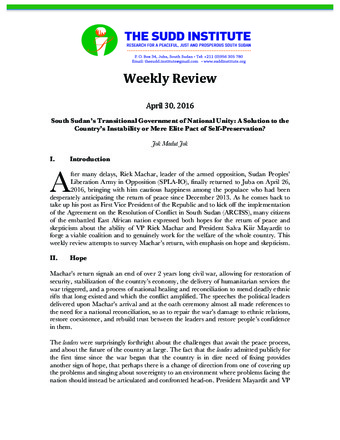
South Sudan’s Transitional Government of National Unity: A Solution to the Country’s Instability or Mere Elite Pact of Self-Preservation?
Author: Jok Madut Jok
Organization: The Sudd Institute
Type: Weekly Reviews
Date: 30/04/2016
After many delays, Riek Machar, leader of the armed opposition, Sudan Peoples’ Liberation Army in Opposition (SPLA-IO), finally returned to Juba on April 26, 2016, bringing with him cautious happiness among the populace who had been desperately anticipating the return of peace since December 2013.
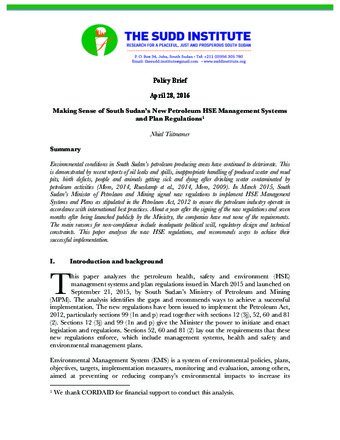
Making Sense of South Sudan’s New Petroleum HSE Management Systems and Plan Regulations
Author: Nhial Tiitmamer
Organization: The Sudd Institute
Type: Policy Briefs
Date: 28/04/2016
Environmental conditions in South Sudan’s petroleum producing areas have continued to deteriorate. This is demonstrated by recent reports of oil leaks and spills, inappropriate handling of produced water and mud pits, birth defects, people and animals getting sick and dying after drinking water contaminated by petroleum activities (Moro, 2014, Rueskamp...
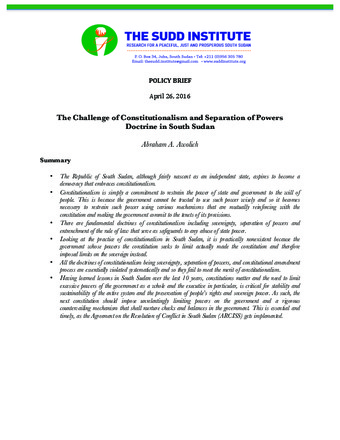
The Challenge of Constitutionalism and Separation of Powers Doctrine in South Sudan
Author: Abraham Awolich
Organization: The Sudd Institute
Type: Policy Briefs
Date: 26/04/2016
The Republic of South Sudan, although fairly nascent as an independent state, aspires to become a democracy that embraces constitutionalism. Constitutionalism is simply a commitment to restrain the power of state and government to the will of people.
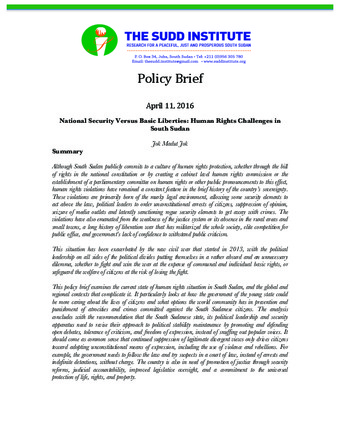
National Security Versus Basic Liberties: Human Rights Challenges in South Sudan
Author: Jok Madut Jok
Organization: The Sudd Institute
Type: Policy Briefs
Date: 11/04/2016
Although South Sudan publicly commits to a culture of human rights protection, whether through the bill of rights in the national constitution or by creating a cabinet level human rights commission or the establishment of a parliamentary committee on human rights or other public pronouncements to this effect, human rights...

